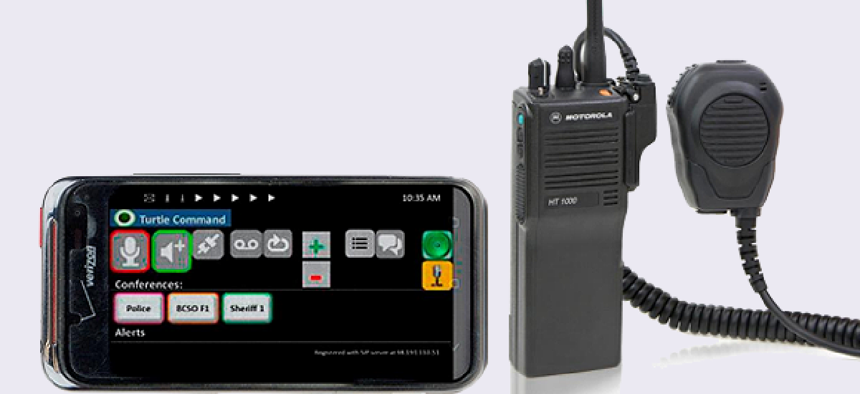Turtle Mike speeds multichannel emergency response


Connecting state and local government leaders
The Department of Homeland Security has developed a bridging technology that enables public safety response teams to unite land mobile radio and broadband to help coordinate rescue and speed emergency response.
The Department of Homeland Security has developed a bridging technology that enables multiple public safety and law enforcement response teams to unite land mobile radio (LMR) and broadband to help coordinate rescue and speed the care of emergency victims.
The Hybrid Public Safety Microphone, dubbed Turtle Mike, merges LMR and broadband systems to form a teleconference platform that can be accessed by both systems.
DHS’s Science and Technology Directorate’s (S&T) recently completed successful two-week field tests of the technology in Nebraska. Turtle Mike was funded by S&T’s First Responders Group (FRG) at the request of DHS’s U.S. Customs and Border Protection.
The ultimate benefit of Turtle Mike is that it enhances coordination with responders who may not have access to LMR radios. Furthermore, Turtle Mike does not require costly replacement of existing communications equipment and infrastructure.
Broadband and LMR systems currently operate independently of one another. First responders, medical teams and other supporting elements use standard LMR radios, which have limited frequencies and bands, and augment them with smart devices using cellular broadband networks.
“If you have an incident, there are many different people who have to communicate at the same time on the same system. Turtle Mike allows direct contact easily between police, medical and fire responders and the hospital using different communications equipment; this is vital,” said FRG telecommunications specialist Tom Chirhart.
The cellular networks allow for greater coverage. “Some radio bands don’t have the signal penetration in buildings that others do,” Chirhart added. “The signals bounce off or are absorbed by the structure. Because broadband frequencies are higher, they have better signal penetration in densely constructed buildings.”
Broadband offers better capacities to carry or exchange content such as images and video, according to an S&T description of the technology.
Even so, first responders will likely continue to use LMR, at least for the foreseeable future, as commercial broadband networks do not have the same capabilities of an LMR system, such as push-to-talk and radio-to-radio capabilities. Turtle Mike, a hardware platform and app, creates a “teleconference platform” accessible by both systems. Users can communicate via LMR or broadband and set up broadband conferences on their cellular networks.
“The Turtle Mike takes the conversation off the frequencies and bridges them together,” Chirhart said. “You can talk radio-to-radio or broadband-to-broadband or radio-to-broadband. It connects everyone together.”
Turtle Mike is also compatible with any existing LMR system and the app can be downloaded to any smart device. Once installed, the app allows first responders to access LMR channels from their smart phones and other devices. Users can then set up an unlimited number of separate broadband conferences that can be tailored to the incident.
Phase one laboratory testing is now concluding at the Public Safety Communications Research Program in Boulder, Colo. If the Turtle Mike solution is approved, phase two testing with actual DHS users will take place in 2015.
During phase two, S&T will update the preliminary prototype, correct shortfalls and add advanced features. The prototype will then undergo additional field tests to evaluate the technology and verify that responder requirements were met. Turtle Mike is also expected to be commercially available this year.
S&T is already moving forward with new applications of the technology. Last year, Vanessa Burnett, program manager of FRG’s Office for Interoperability and Compatibility, S&T, described using Turtle Mike technology for school safety measures.
“Turtle Alerts” would be used to provide “managed, direct communication between school staff and first responders in emergency situations,” Burnett noted in her presentation.




